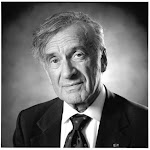At this point in the story, Rosh Hashanah is coming for the Jews. On the eve of the holy day, all tensions were strung tightly, wondering if it would be the "last day of the [calender] year" or really the last day. As the evening's soup was distributed, everyone refrained from eating. They would wait until after prayer. As night fell, everyone began to assemble in the the camps center square, the Appelplatz. Almost 10,000 of the prisoners, the Blockälteste, and the Kapos gathered together in order to pause and recognize the time of meaning in their church year.
Elie's thought process was concentrated on the interrogation of God, asking who He was and what He had to say about such evil days as these. For what Elie had been through, his questions were a logical part of his coping with such unexplainable massacres. He resisted and rebelled, straining in an effort not to follow along with the group reciting the prayer. In the end, he decided within himself that he was stronger than God, "felt myself to be stronger than this Almighty" being to whom his neighbors were praying. Now he was only "an observer, a stranger."
Then came Yom Kippur, "The Day of Atonement," but the debated question was, "Should everyone fast?" Most felt that they had no need to fast, they were already fasting as it was. Others though felt that the intention of fasting was still good, and that they could give up one days worth of food in order to sacrifice for their sins. Elie, having anything but a strong faith at this point, decided he would eat in protest, in protest of a God who was not there for them in their time of need.

The next horrible event to take place was the selection. It was simply known as "selection" and was everything that the name implies. Those who were deemed to be weak and unhealthy by the SS had their numbers taken down and they were acknowledged as being good for the crematorium. Elie's Blockälteste had been through selection before and he spoke to his block before they went before the examination board saying,
"In a few moments, selection will take place. You will have to undress completely. Then you will go, one by one, before the SS doctors. I hope you will all pass. But you must try to increase your chances. Before you go into the next room, try to move your limbs, give yourself some color. Don't walk slowly, run! Run as if you had the devil at your heels! Don't look at the SS. Run, straight in front of you!"
When Elie's turn came, he "ran without looking back." The run seemed to last forever for him, but when he finally reached Tibi and Yossi, two of his young companions, on the other side, he was relied to hear that the infamous Dr. Mengele had not taken down his number. Yossi smiled and said, "Anyways, they couldn't have. You were running too fast..."
When the bell rang to signal the end of selection, Elie raced towards Block 36, his father's block. Meeting him in the middle, both were relieved when they heard that the other had pasted. Life was insured for now.





.jpg)
